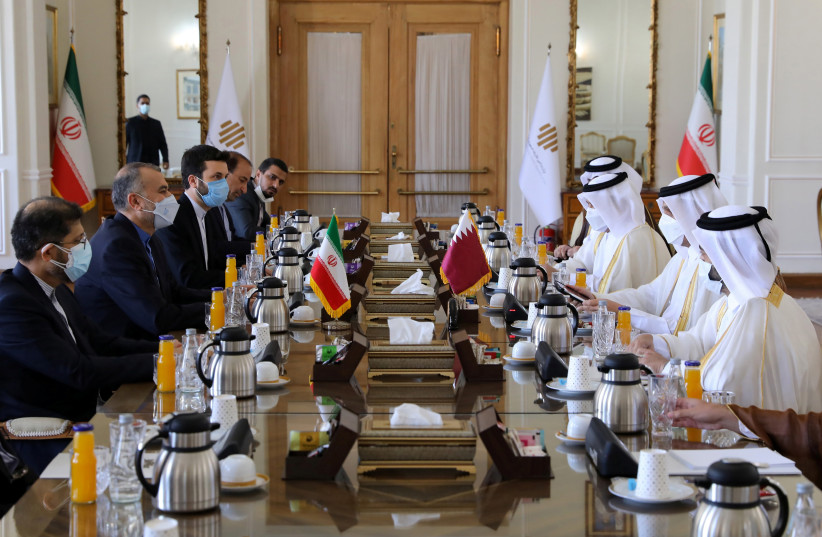by Tovah Lazaroff
Iran reportedly drops the insistence that the US remove Iranian Revolutionary Guard from State Department terror.
 |
Iran's Foreign Minister Hossein Amir Abdollahian meets with Qatari
Deputy Prime Minister and Foreign Minister Mohammed bin Abdulrahman Al
Thani, in Tehran, Iran, September 9, 2021.
(photo credit: REUTERS)
|
National Security Adviser Eyal Hulata is expected to head to Washington this week as Israel attempts to sway the United States to walk away from the Iran deal just as Tehran hinted it may be willing to finalize the agreement.
CNN reported on Saturday that the Islamic Republic dropped one of its key demands for the revival of the 2015 Joint Comprehensive Plan of Action, known as the Iran deal, designed to prevent it from producing a nuclear bomb.
The Trump administration had exited the deal in 2018, warning it emboldened rather than contained Iran. US President Joe Biden has sought to revive the deal, but until recently, negotiations had appeared to hit a standstill.
One of the sticking points had been Tehran’s insistence that the US remove the Iranian Revolutionary Guard Corps from the State Department’s list of Foreign Terror Organizations.
Washington had refused to compromise on the issue, which made the deal’s revival seem unlikely.

According to CNN, Tehran has now dropped that demand.
A senior Israeli official told KAN news that the US has not made any final decision with respect to the deal, which was also signed with Russia, China, France, Germany and the United Kingdom.
Still, the official said, the dynamic appears to be one that is leading to a conclusion of the indirect negotiations that the European Union has been holding between the US and Iran to revive the deal.
Prime Minister Yair Lapid spoke against the deal on Thursday with German Chancellor Olaf Scholz, US Ambassador to Israel Tom Nides and chairman of the Congressional Subcommittee on the Middle East, Rep. Ted Deutch (D-Florida).
Nides tweeted after the conversation with Lapid and Deutch that “we reiterated the US government’s ironclad commitment to Israel’s security in the face of Iranian aggression.”
Israeli concerns
Israel had always opposed the deal, but now it fears that America will make dangerous concessions in an attempt to finalize the matter.
A senior Israeli official told Ynet that it still seems possible to change the direction in which the US appears to be going.
There have been other moments when it appeared that the negotiations were in an advanced stage, the official said. The difference here is that there appears to be an Iranian willingness to finalize the talks, he said.
Iran earlier this week had sent the European Union a response to what it had called its “final” proposal to save a 2015 nuclear deal after Tehran called on Washington to show flexibility.
After 16 months of fitful, indirect US-Iranian talks, with the EU shuttling between the parties, a senior EU official said on August 8 that the bloc had laid down a “final” offer and expected a response within a “very, very few weeks.”
Iran responds to deal proposal
Iran responded to the proposal late on Monday but none of the parties provided any details.
Washington has said it is ready to quickly seal a deal to restore the 2015 accord on the basis of the EU proposals.
Diplomats and officials have told Reuters that whether or not Tehran and Washington accept the EU’s “final” offer, neither is likely to declare the pact dead because keeping it alive serves the interests of both sides.
The stakes are high, since failure in the nuclear negotiations would carry the risk of a fresh regional war, with Israel threatening military action against Iran if diplomacy fails to prevent it from developing nuclear weapons capability.
Iran, which has long denied having such ambitions, has warned of a “crushing” response to any Israeli attack.
Reuters contributed to this report.
Tovah Lazaroff
Source: https://www.jpost.com/middle-east/iran-news/article-715154
No comments:
Post a Comment